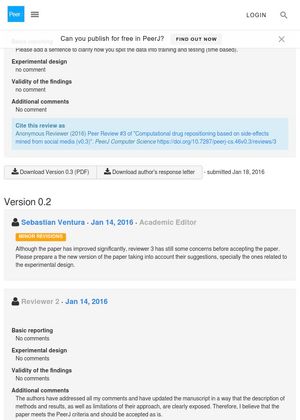Peer Review of Computational Drug Repositioning Based on Side-Effects Mined from Social Media
February 2016

TLDR Reviewers criticized the study's methods and suggested focusing on drug mechanisms instead of repositioning due to social media data quality concerns.
In 2016, a study proposing a computational method for drug repositioning based on side-effects data mined from social media was peer-reviewed. The reviewers raised concerns about the study's methodology and conclusions. They questioned the data splitting process, the handling of social media's inherent limitations like idiomatic expressions and spelling errors, and the assumption that drugs with similar side-effects share a common mechanism of action. They also criticized the study's reliance on an unpublished paper and the lack of clarity in the evaluations. The reviewers suggested that the study should have focused on identifying drugs with similar mechanisms rather than repositioning, and called for a more thorough discussion on the quality of data used, especially considering the informal and potentially misleading nature of tweets.